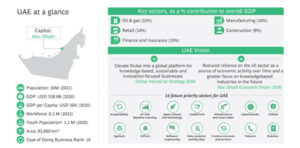Talent Outsourcing Services In The UAE To Reach USD 6.8 Billion By The End Of 2023 With A 7% Compound Annual Growth Rate
Ranked 16th globally for ease of doing business, the United Arab Emirates (UAE) is now the second-largest economy in the Arab world, with a gross domestic product (GDP) of around USD 360 billion in 2020. As one of the key markets or demand “hot spots” for job outsourcing, the country is rising as a strategic hub where entities can easily outsource parts of their value chains and source-in talent from third parties, thus facilitating high growth overtime.
According to a new report by Boston Consulting Group (BCG) in collaboration with Forward MENA previously known as Beirut Digital District (BDD) Academy, the total spending by UAE-based organizations on outsourcing services from local and offshore providers was estimated at over USD 4.8 billion in 2018 and is expected to reach USD 6.8 billion in 2023, with a compound annual growth rate (CAGR)of approximately7%.
The report, titled “MENA Talent Map”, finds that the UAE is one of the largest suppliers of talent in the Gulf Cooperation Council (GCC). Customer support, finance and accounting, human resources, and KPO are the major jobs and job clusters supplied by the UAE.
In terms of the nation’s future economic outlook, three job clusters were highlighted to help drive long-term strategies, which in turn signal strong growth potential for job outsourcing. These are infrastructure management services, such as cloud engineers and cybersecurity analysts; software and applications development, that include software engineers but also application developers; and finally, data and artificial intelligence (AI), for data scientists and blockchain developers.
“The UAE is striving to diversify its economy with its national and Emirate-level agendas revolving around emerging themes of sustainable economic development, cutting-edge innovation, digital transformation, safety and security, and advanced science, technology and artificial intelligence. With the country calibrating on future-forward initiatives, we expect the country diversification outlook to exceed expectations and ground the nation as a fully rounded hub across industries,” said Dr. Leila Hoteit, Managing Director and Senior Partner, BCG.
Furthermore, when it comes to spending on job outsourcing services and sourcing-in talent, certain key industries spring up. As outlined in the study, the most prominent by far are financial services, public sector, hospitality, leisure and telecommunications.

BCG collaborated with Forward MENA previously known as Beirut Digital District(BDD) Academy to examine the growth of remote work ecosystems in six developing countries in the Middle East and North Africa (MENA): Lebanon, Jordan, Iraq, Egypt, Morocco, and Tunisia.
Learn more about the regional findings here.







